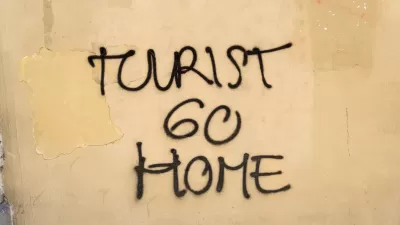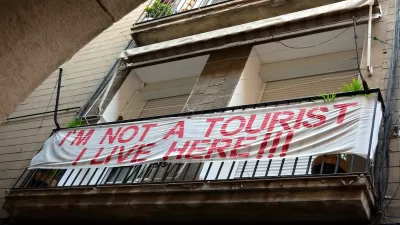The plan would reduce visitor accommodation by 25% resulting in 1,900 jobs lost.

In May, the mayor of Maui made a bold announcement. As part of an ongoing effort to address the chronic housing shortage, exacerbated by the 2023 wildfires, the county would by eliminate more than 7,000 short-term vacation rental units — more than half of the island’s stock — and convert them to long-term housing by January 1, 2026.
While it’s looking unlikely that the county will hit that date, a recent study released by the University of Hawaiʻi Economic Research Organization suggests that the delay might not be the worst thing. Honolulu Civil Beat reports that the study found that such a massive shock to the tourism-dependent economy could have potentially catastrophic consequences.
Erin Nolan reports for the Beat that the massive sudden change to the market would cause a 20-40 percent drop in condo prices in the area. While the increase in housing affordability would be welcome and intended, it would also cause a $60 million drop in property tax revenue for the county.
In addition, the 25 percent drop in visitor accommodation that the change would prompt would cause an estimated $900 million drop in visitor spending and 1,900 jobs to be lost.
The study acknowledged that a bold revisioning of the housing market was important to address, “However, given the scale of the potential economic disruption, careful implementation, monitoring, and flexibility will be essential to maximize benefits while minimizing unintended harm.” Researchers recommended pursuing other alternatives such as new taxes, rental permit auctions and incentives for new development.
Read the Honolulu Civil Beat’s full story, which links to the study, below.
FULL STORY: Study: Maui Should Be Cautious In Phasing Out Vacation Rentals

Planetizen Federal Action Tracker
A weekly monitor of how Trump’s orders and actions are impacting planners and planning in America.

Congressman Proposes Bill to Rename DC Metro “Trump Train”
The Make Autorail Great Again Act would withhold federal funding to the system until the Washington Metropolitan Area Transit Authority (WMATA), rebrands as the Washington Metropolitan Authority for Greater Access (WMAGA).

The Simple Legislative Tool Transforming Vacant Downtowns
In California, Michigan and Georgia, an easy win is bringing dollars — and delight — back to city centers.

The States Losing Rural Delivery Rooms at an Alarming Pace
In some states, as few as 9% of rural hospitals still deliver babies. As a result, rising pre-term births, no adequate pre-term care and harrowing close calls are a growing reality.

The Small South Asian Republic Going all in on EVs
Thanks to one simple policy change less than five years ago, 65% of new cars in this Himalayan country are now electric.

DC Backpedals on Bike Lane Protection, Swaps Barriers for Paint
Citing aesthetic concerns, the city is removing the concrete barriers and flexposts that once separated Arizona Avenue cyclists from motor vehicles.
Urban Design for Planners 1: Software Tools
This six-course series explores essential urban design concepts using open source software and equips planners with the tools they need to participate fully in the urban design process.
Planning for Universal Design
Learn the tools for implementing Universal Design in planning regulations.
Smith Gee Studio
City of Charlotte
City of Camden Redevelopment Agency
City of Astoria
Transportation Research & Education Center (TREC) at Portland State University
US High Speed Rail Association
City of Camden Redevelopment Agency
Municipality of Princeton (NJ)





























